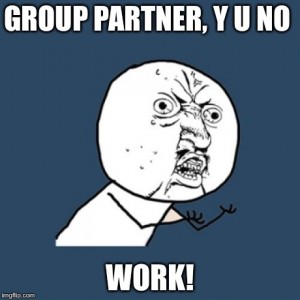Many of us have experienced Project Work (PW) during our JC days. Remember the joy when the oral presentation was over? The sense of freedom we thought we’ve achieved? Little did we know what was in store for us in university. Now, it’s like we have four PWs in one semester! Especially in this period nearing the end of the semester, most of us are currently working on our group projects and presentations, which can be quite stressful. It may all depend on the task and your group mates, and different people would have different issues, but we have listed some general advice that we hope can help you sail through all your group work smoothly!
- Setting clear goals and making sure everyone is on the same page
The truth is, some of us would want to do better in the subject more than others, who may have even planned to S/U the module right from the start. So it is important to set a common goal that the whole group would work towards together. Everyone may have different styles of working, with their own strengths and weaknesses. We should recognise these differences and make sure that despite them, the group as a whole is on the same page. Identifying each member’s strengths and weaknesses from the start also helps the group to distribute work more efficiently. For instance, instead of dividing the work based on different parts of a report, it may be better to assign some people who are better at researching to collect the data, and those who are better in writing to work on the phrasing and flow of the report. Smaller goals and deadlines along the way also helps the group to be on track and avoid procrastination!
- Giving and receiving feedback
Nobody is perfect –we are all well-aware of that. But it is easier to see these imperfections in other people’s work than in our own. How do we tell them about these imperfections that we see? There is a fine line between criticising and giving feedback. Instead of criticising, which tends to be more personal, we should try to give feedback as objectively and as constructively as possible. Similarly, when we’re on the receiving end, we need to be mature about it and not take our groupmates’ feedback personally. One possible strategy for giving feedback is the sandwich method, which is when we give a positive feedback first, followed by the problematic areas, and ended it off on a positive note with another positive feedback. This improves objectivity of our feedback and as the person receiving is likely to feel better, they also tend to be more receptive of the feedback.
- Dealing with free-riders
Yes, the ultimate enemy in group projects – the free-riders. Some may do it more subtly, still appearing in group chats but making meaningless contribution to the project itself. Others, a very rare breed of university students, just completely vanish! They do not say anything and may not even come for tutorials – to the point that you start wondering if they’re even still taking the module. In summary, dealing with free-riders is an all-round tricky business. It is unfair to let them enjoy the same grade as the rest of the group who have put in effort, but trying to get them to do work might actually do more harm than good as it only adds more things to do for yourself. Of course we should still give them chances and keep them in the loop, instead of completely excluding them. We never know, they may have a legitimate reason for not contributing. But if they really show no interest after some time, the group should not waste their time and effort worrying and may want to report the issue to your lecturer or Professor.
- Striking a balance between fun and work
Group work need not be a serious business all the time. After all, we’re still university students who want to have fun with our friends, including our groupmates. Creating a lighter mood and a more fun environment may actually help the group’s productivity. Just look at Google and how they try to make their workplace less rigid! Instead of merely treating our groupmates as partners for our project, we should try to get to know them on a more personal level to build a more inclusive team spirit. Don’t limit your conversations to just be about the project, or about school for that matter; talk about anything under the sun and find your common interests!
Hopefully these tips can help in surviving the busy period filled with group work! 🙂


